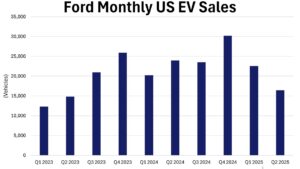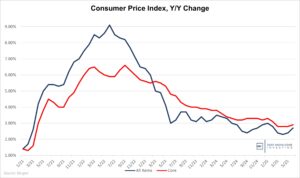This piece was originally published on October 12th, 2023.
For the past two years, the financial world has focused on the actions of the Federal Reserve, wondering when they’d pause rate hikes or pivot to lower rates. While the Fed has an enormous amount of power, they only control the very short end of the yield curve through the fed funds rate. The market sets the price for the rest of the yield curve.
During normal times, most of the yield curve prices off of the fed funds rate with yields rising as bond duration increases. That’s just a fancy way of saying that the market typically starts from the fed funds rate, and adds a little more yield as the time to maturity increases. So, the two-year typically yields a little more than the fed funds rate. The ten-year Treasury yields a little more. This continues all the way out to the 30-year Treasury. (The curve is inverted right now which is why I clarify “normal times”.)
However, when Congress overspends by too much, and the Treasury and the Federal Reserve conspire to increase the money supply, the market can decide to take matters into its own hands. At the extreme, the market can reject a government bond offering until the price falls a great deal and the yield spikes. The nickname for the bond buyers who refuse to buy the next offering at market rates is “bond vigilantes”. The idea is that the government has control until the bond market reclaims it.
Today’s 30-year Treasury auction didn’t go well. There was a lack of demand and the final yield was over 4.8% vs last month’s 4.3%. Half a percent may not sound like much, but in the bond market, 50 basis points is a lot. The market fell today not because of a higher-than-expected consumer price index; but rather, because the government auction didn’t go well.
On one hand, higher long-term yields will do some of the Fed’s work for them and make the next rate hike potentially unnecessary. This would be the “bull” case. On the other hand, we are seeing declining trust in government-reported statistics, and the Fed is losing control of the long-end of the yield curve. The market is signaling declining trust in the government. That’s the “bear” case.
DKI has been telling you for two years that government statistics do not represent reality; but rather, exist to advance a preferred narrative. I typically use the word “nonsense” to politely indicate when I think someone isn’t being completely truthful. Government statistics are one of the few cases where I openly use the word “lies”. The market is coming to that conclusion as well and that’s why equity indexes fell today. There’s no upside in being a cheerleader for higher stock prices or the failure of government trust. The bond vigilantes are right to be skeptical. This is why we’re so heavily hedged right now.
IR@DeepKnowledgeInvesting.com if you have any questions.
Information contained in this report is believed by Deep Knowledge Investing (“DKI”) to be accurate and/or derived from sources which it believes to be reliable; however, such information is presented without warranty of any kind, whether express or implied and DKI makes no representation as to the completeness, timeliness or accuracy of the information contained therein or with regard to the results to be obtained from its use. The provision of the information contained in the Services shall not be deemed to obligate DKI to provide updated or similar information in the future except to the extent it may be required to do so.
The information we provide is publicly available; our reports are neither an offer nor a solicitation to buy or sell securities. All expressions of opinion are precisely that and are subject to change. DKI, affiliates of DKI or its principal or others associated with DKI may have, take or sell positions in securities of companies about which we write.
Our opinions are not advice that investment in a company’s securities is suitable for any particular investor. Each investor should consult with and rely on his or its own investigation, due diligence and the recommendations of investment professionals whom the investor has engaged for that purpose.
In no event shall DKI be liable for any costs, liabilities, losses, expenses (including, but not limited to, attorneys’ fees), damages of any kind, including direct, indirect, punitive, incidental, special or consequential damages, or for any trading losses arising from or attributable to the use of this report.




